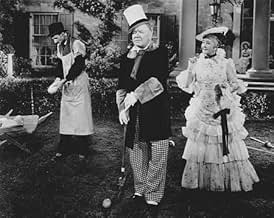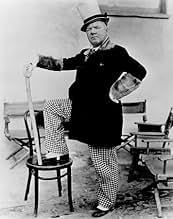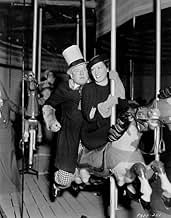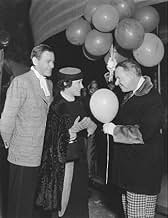अपनी भाषा में प्लॉट जोड़ेंCarny con artist and snake-oil salesman Eustace McGargle tries to stay one step ahead of the sheriff but is completely devoted to his beloved daughter Poppy.Carny con artist and snake-oil salesman Eustace McGargle tries to stay one step ahead of the sheriff but is completely devoted to his beloved daughter Poppy.Carny con artist and snake-oil salesman Eustace McGargle tries to stay one step ahead of the sheriff but is completely devoted to his beloved daughter Poppy.
- Countess Maggi Tubbs DePuizzi
- (as Catharine Doucet)
- Carnival sword swallower
- (बिना क्रेडिट के)
- Boy
- (बिना क्रेडिट के)
- Bit part
- (बिना क्रेडिट के)
- Young woman
- (बिना क्रेडिट के)
- Gardener
- (बिना क्रेडिट के)
- Bartender
- (बिना क्रेडिट के)
- BIT part
- (बिना क्रेडिट के)
फ़ीचर्ड समीक्षाएं
It's true that the sentimental narrative, romantic subplot and even a couple of songs get in the way of the comedy highlights, but Fields himself is in fine form here (he originated the role of Professor Eustace McGargle on stage and had already appeared in a Silent version of the Dorothy Donnelly play called SALLY OF THE SAWDUST [1925] - directed, of all people, by D.W. Griffith and, for this reason, making it one of the very few Fields Silents released on DVD!). Incidentally, the star was seriously injured during the making of POPPY - not that his performance is effected in any way. Here, also, we're treated to the same kind of period atmosphere as in THE OLD FASHIONED WAY (1934): Fields, however, is a sideshow performer instead of the manager/lead actor of a theatrical troupe and has exchanged the awkward golf practice of YOU'RE TELLING ME! (1934) for the game of croquet - at which he's equally inept (besides playing an instrument called the kadoola to replace his memorable juggling act in THE OLD FASHIONED WAY). As in MAN ON THE FLYING TRAPEZE (1935), too, here we get various instances of Fields' unique and hilarious shriek whenever he takes a fall.
Among the film's best gags/lines are the following: the 'talking' dog scam; Fields berating a hot dog vendor for 'seeking his advise' in the sale of two half-eaten loaves, after the latter insulted him by suggesting that Fields couldn't afford to pay for them; he keeps running into a cadaverous fellow he swindled and who relentlessly asks for his money back; Fields mistaking a helpful gesture as to his presumed wife's distinctive features (the man indicated a mole under her ear, but Fields thought he meant she had sideburns!); his remark about the horse he was fleeing on dying out on him right in front of the police station. By the way, the last line of the film, "Never give a sucker an even break", gave the name to one of Fields' most famous vehicles (also included in the set and which I watched earlier this week).
Now I need to pick up the four remaining Fields films that are available on DVD - the afore-mentioned SALLY OF THE SAWDUST, SIX OF A KIND (1934), David COPPERFIELD (1935) and THE BIG BROADCAST OF 1938 (1938) - all but the first of which have been issued as part of some collection or other. Incidentally, there are still enough unreleased Fields movies from the Talkie period to compile yet another Universal set; so, let's hope they deliver sooner rather than later...
Set in 1883, Professor Eustace McGargle, a swindling carnival man wearing top hat, checkered pants and spats, comes to a small town with his daughter, Poppy (Rochelle Hudson) where he establishes himself as the prize medicine selling star of a traveling carnival, while Poppy wanders about and meets and falls in love with Billy Farnsworth (Richard Cromwell), a mayor's son, but because of Poppy's sideshow background, the Farnsworth family look down on her. Only Sarah Tucker (Maude Eburne), a matron woman, takes a liking to Poppy, and later discovers something about her true identity that makes things right again with the Farnsworths.
Aside from the romantic subplot between Hudson and Cromwell (who nearly resembles MGM's own Franchot Tone when wearing that derby), Fields manages to come off with some good comedy routines, such as cheating a bartender into buying his "talking" dog; purchasing frank-furthers (or better known to some as hot dogs) for himself and Poppy from a vendor (Tom Kennedy) with McGargle telling him that he will get paid at the conclusion of his engagement. The outraged vendor demands the money for his hot dogs, so McGargle and Poppy decide that since they cannot pay for them, they might as well give them back to him, half-eaten, ending with this funny exchange: Kennedy: "Listen you tramp, how am I gonna sell these again?" Fields: "First you insult me, then you ask my advice concerning salesmanship!" This amusing bit is soon followed by McGargle selling medicine bottles for one dollar. A naive patron (Bill Wolfe) acquires one and pays for them by giving McGargle a $5 bill, but never gets his $4 change. Instead, McGargle quiets down the customer by giving him four more bottles, and "No more!!"; followed by some amusing bits involving character actress Catherine Doucet as Countess Maggie Tubbs DePuizzi. When Fields is not on screen, Hudson as Poppy gets to sing one nice song, "Rendezvous With a Dream" (by Ralph Rainger and Leo Robin) twice. The title tune of "Poppy" is sung by off-screen singers during its opening credits. Also featured in the cast are Lynne Overman as a hick lawyer; Rosalind Keith as the snobbish Frances Parker; and Granville Bates, among others.
In spite of some leisure moments, POPPY, at 73 minutes, is really worth viewing and rediscovering to fans of the Great Tomato Nose Thanks to TCM for bringing this rare gem back on TV again. Currently available on DVD. (***1/2)
It is a blessing that Fields is in this film at all. Without him, POPPY would be forgettable. The late 19th century settings, particularly a carnival locale, are pleasing to the eye. Director Edward Sutherland imbues this milieu with pastoral charm, evoking a nostalgia for a simpler, more innocent time. Never mind if that time wasn't actually as rosy as this film indicates.
Alas, the charming period atmosphere cannot enhance the tired scenario. The romance between Poppy (Rochelle Hudson), a girl from the wrong side of the tracks, and Billy Farnsworth (Richard Cromwell), a boy from a wealthy and prestigious family, was old hat even in 1936. Hudson is bland and Cromwell is wooden, so one feels little empathy toward them.
Fields rescues POPPY from tedium. As Poppy's guardian Professor Eustace McGargle, he flimflams his way through everything. His larcenousness provide for some wonderful routines that elevates the film to classic comedy such as when he cons a bartender (Wade Boteler) into purchasing a "talking" dog and when he tries to get hot dogs for himself and Poppy without paying. These bits remain in one's memory after the love story is forgotten. Fields also reveals a tender, avuncular side in his intimate moments with Hudson. One understands her dedication to him, despite his crookedness.
POPPY does not rank among Fields' best work. But it demonstrates his greatness not only in that he rises above ordinary material, but that he vigorously soldiers throughout his scenes despite his real life ailments.
क्या आपको पता है
- ट्रिवियाWhile filming the movie, W.C. Fields regularly drank from a flask, which he insisted was only "pineapple juice." One day, however, the stagehands replaced the vodka in the flask with real pineapple juice. When Fields tasted it, he sputtered and shouted, "Who put pineapple juice in my pineapple juice?!"
- भाव
Hot dog vendor: [as McGargle and Poppy begin to eat their hot dogs] Twenty cents, please!
Professor Eustace McGargle: Very reasonable! I'll pay you at the conclusion of our engagement.
Hot dog vendor: Oh, no, you won't! You're gonna pay me right now!
Professor Eustace McGargle: [the vendor takes back Poppy's half-eaten hot dog] Really! I shall return mine also.
Hot dog vendor: [looking at McGargle's half-eaten hot dog] Listen, you tramp, how am I gonna sell these again?
Professor Eustace McGargle: First you insult me. Then you ask my advice concerning salesmanship. You, sir, are a dunce! DUNCE, sir! D-U-N-C... How do you spell it?
[Walking away with Poppy]
Professor Eustace McGargle: Come, dear, let's go.
- क्रेज़ी क्रेडिटThe film opens with a shot of a flower blooming, with the title "Poppy" emerging from the flower as it blooms. The flower motif continues through the rest of the opening credits.
- कनेक्शनFeatured in W.C. Fields: Straight Up (1986)
- साउंडट्रैकPoppy
(1936) (uncredited)
Music by Friedrich Hollaender (as Frederck Hollander)
Lyrics by Sam Coslow
Played during the opening credits and Sung by an unidentified chorus
टॉप पसंद
विवरण
- चलने की अवधि1 घंटा 13 मिनट
- रंग
- पक्ष अनुपात
- 1.37 : 1
इस पेज में योगदान दें

































